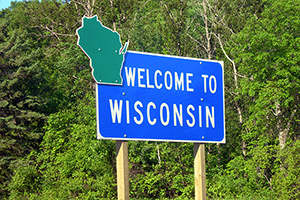New Wisconsin DOT Secretary Says State Must Spend Less on Roads, Build Fewer Projects

The vexing challenge of how to pay for Wisconsin’s roads and bridges has a simple solution: Build less and prioritize more, new state Department of Transportation Secretary Dave Ross told lawmakers March 16.
“It’s a spending problem, not a revenue problem,” Ross said.
Ross, testifying to the state Senate Transportation committee, placed new emphasis on what he called a key contributor to excessive transportation spending: committing to build too many large highway expansion projects at once.
After Ross’ testimony, the committee voted on party lines, 3-2, with Democrats opposed, to forward Ross’ nomination as DOT secretary to a full Senate vote.
RELATED: New Wisconsin transport secretary — audit signals we must 'change the culture,' be transparent
Ross’ testimony complements Gov. Scott Walker’s no-new-tax stance heading into a potential transportation budget battle with Assembly Republicans. That fight could escalate in the coming months as Walker and lawmakers craft the state’s next two-year budget.
Minority Democrats on the committee pushed back during the March 16 hearing.
They said mounting transportation-borrowing costs and a growing backlog of highway projects mean an infusion of revenue — likely through a gas tax or vehicle registration fee increase — must be part of the solution. Some Republican lawmakers, including Assembly GOP leaders, also are open to such an increase.
“We have a governor who’s placing, in my own personal humble opinion, is placing his own re-election [ahead] of taking care of the crisis in our transportation system,” said Sen. Tim Carpenter (D-Milwaukee).
RELATED: Critical Wisconsin DOT audit finds highway project costs underestimated by $3 billion
Ross cited the list of major state highway projects underway — 17 were listed on a report last month to the Transportation Projects Commission — as evidence of what he described as the DOT taking on more than it could handle.
He noted federal highway officials urged WisDOT in a December letter to better prioritize projects while voicing concern with “the number of large-scale highway projects that have encountered construction delays.”
But Ross suggested lawmakers weren’t entirely to blame for green lighting so many projects. He cited the findings of a recent state audit of the department, which showed it underestimated the cost of ongoing highway projects by a combined amount of more than $3 billion over a period of decades.
“Without accurate cost estimates, we’ve put too much into the pipeline,” Ross said. “We decided to remodel our kitchen, our bathroom and our rec room all at the same time.”
Ross did not cite examples of projects that should be removed from the department’s building schedule.
Two major Dane County highway projects, expansions of Interstate 39-90 and Verona Road, would avoid delays under Walker’s proposal for the state’s next transportation budget.
But future projects are on the chopping block.
The department announced last month it is scrapping a study of whether to expand or rebuild interstates linking Madison to Wisconsin Dells.
Carpenter, a member of the Transportation Projects Commission, also dinged the department for quietly sidelining a pricey segment of the I-39-90 project.
The Wisconsin State Journal reported last month that WisDOT, with little fanfare, had separated the Beltline interchange with I-39-90 from the larger 39-90 rebuild, of which it originally was part.
“This information was given to the TPC; we voted on it and ‘Oops! Half a billion dollars wasn’t listed,’ ” Carpenter said.
The department later announced the interchange would cost $550 million to rebuild, bringing the cost estimate for the project, as it originally was defined, to $1.75 billion. The latter figure compares with an initial estimate given to lawmakers in 2011, when the project was approved, of $715 million.
Ross told lawmakers in a report filed March 15 that the $550 million Beltline interchange estimate is “totally unacceptable” and the department will re-evaluate it.
Distributed by Tribune Content Agency, LLC


